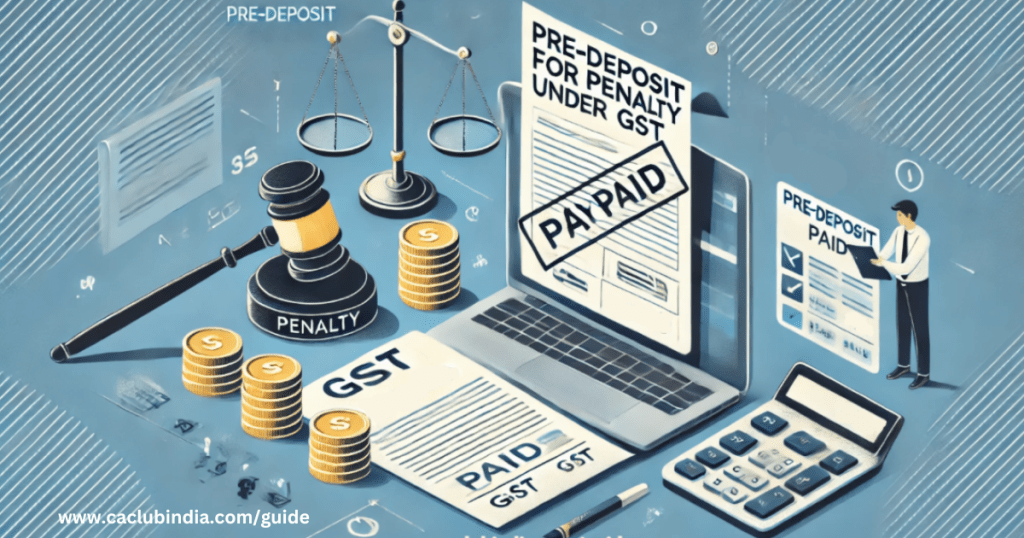
The Central Goods and Services Tax (CGST) Act has been amended to reduce the pre-deposit requirements for penalty disputes. Here’s a quick summary of the changes:
Detailed Context and Background
Pre-Deposit Mechanism in GST Appeals
- Under Section 107 of the CGST Act, an appellant is required to deposit a pre-determined percentage of the disputed amount before filing an appeal.
- For regular disputes involving tax, interest, or penalties, this was set at 10% of the disputed tax amount.
- However, this posed challenges in cases where only penalties were in dispute, especially when no tax liability was involved. Businesses were required to deposit 10% of the tax equivalent to the penalty, making it burdensome.
Recommendation of the 55th GST Council Meeting
- Recognizing the undue burden in penalty-only disputes, the GST Council recommended amending the pre-deposit requirement to 10% instead of 25% the disputed penalty amount.
Government’s Focus
- The government aimed to promote fairness and ease in tax compliance and dispute resolution by distinguishing between tax disputes and penalty disputes.
- This change aligns with the broader GST reform agenda to reduce litigation and improve taxpayer ease.
Key Changes in CGST Act:
Amendment to Section 107(6)
Pre-deposit for filing appeals before the Appellate Authority reduced from 25% to 10% in cases involving only penalty demand, with no tax demand.
Insertion of New Proviso to Section 112(8)
Pre-deposit for filing appeals before the Appellate Tribunal set at 10% in cases involving only penalty demand, with no tax demand.
Practical Implications for Taxpayers
Ease of Filing Appeals
Taxpayers facing penalties for procedural lapses, such as late filings or incorrect invoices, can challenge these penalties with reduced financial stress.
Encouragement for Dispute Resolution
Taxpayers are more likely to challenge unjust penalties, especially when the penalties result from technical or inadvertent errors, ensuring fair adjudication.
Relief for Small Businesses
Small and medium enterprises (SMEs), which often struggle with compliance costs, stand to benefit the most from the reduced pre-deposit requirement.
Streamlining Litigation
Reducing the financial barrier for appealing penalty cases will help unclog litigation processes by encouraging genuine cases and dissuading frivolous appeals.
Comparison: Before and After Amendment
| Aspect | Before Amendment | After Amendment |
| Section 107(6): Appeals before Appellate Authority | Pre-deposit was 25% of the penalty amount. | Pre-deposit reduced to 10% of the penalty amount. |
| Section 112(8): Appeals before Appellate Tribunal | No specific provision for penalty-only cases; general rules applied. | Pre-deposit specified at 10% for penalty-only cases. |
Key Advantages of the Amendment
Fair Burden Sharing
- Aligns pre-deposit requirements proportionally with the nature of disputes.
- Avoids overburdening taxpayers in penalty-only disputes.
Improved Compliance Environment
Reduces taxpayer apprehension regarding penalties and fosters a culture of voluntary compliance.
Focus on Procedural Reforms
Reflects a government emphasis on reducing disputes arising from procedural issues and technical errors.
Broader Implications for GST Framework
Promoting Taxpayer Confidence
This amendment is seen as a positive step in promoting trust between taxpayers and tax authorities.
Litigation Management
By making appeals more accessible, the government aims to reduce the overall volume of unresolved disputes, enabling faster resolution.
Alignment with Ease of Doing Business
Reduced pre-deposit requirements support the government’s larger goal of enhancing India’s rank in Ease of Doing Business, particularly in the domain of tax compliance.
Additional Recommendations from the 55th GST Council Meeting
Apart from the amendment to pre-deposit requirements, the GST Council also made the following key recommendations:
- Introduction of mechanism for automated scrutiny of GST returns to reduce manual intervention.
- Measures to curb tax evasion through stricter compliance monitoring.
- Review of GST rates on certain goods and services to address anomalies.
Next Steps for Taxpayers
Understand Applicability
Identify whether your case involves a penalty-only dispute or a tax liability.
Plan for Appeals
Calculate the revised pre-deposit amount before filing appeals for penalty disputes.
Consult Professionals
Engage tax consultants or legal advisors to ensure compliance with updated provisions and assess the strength of your case.

